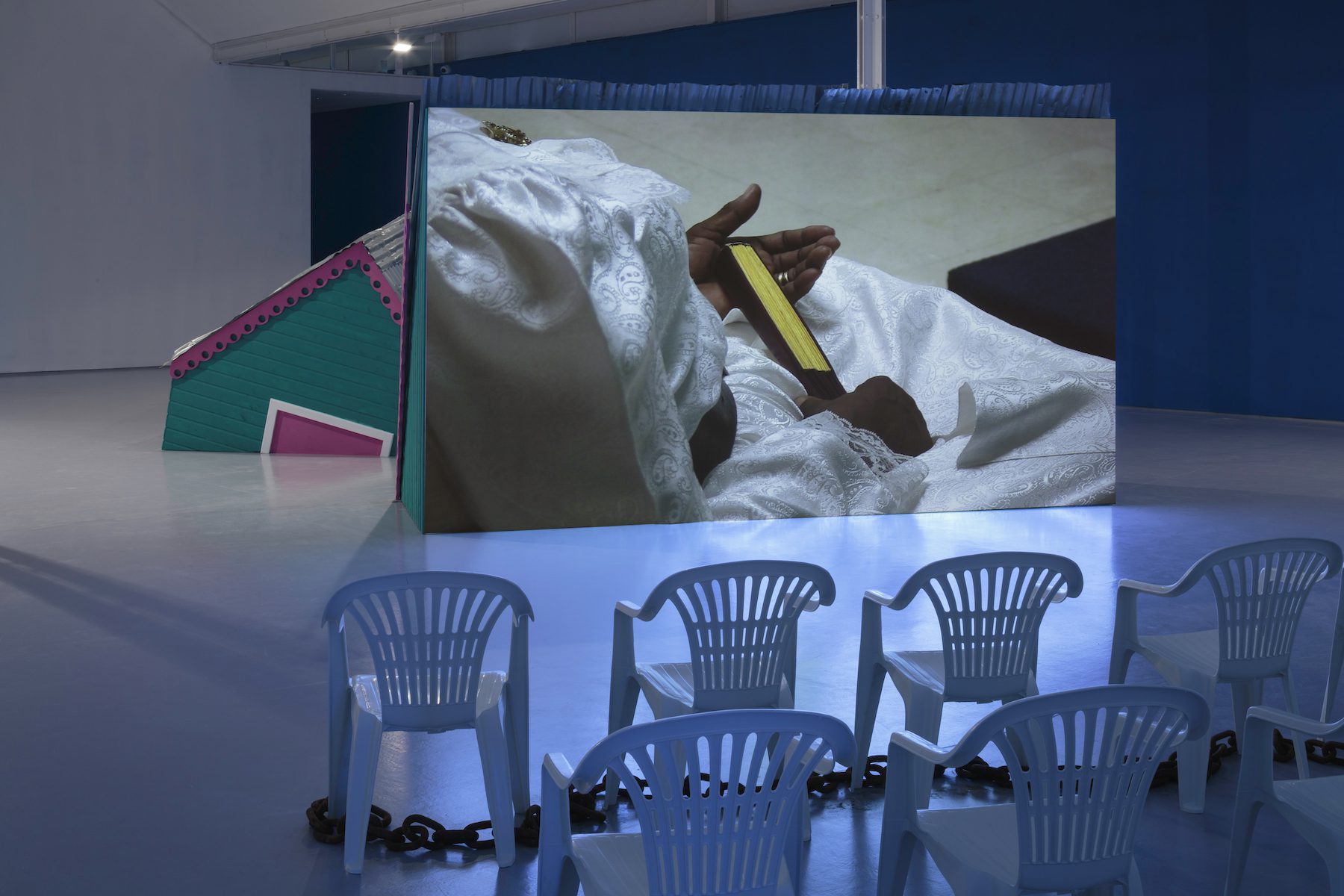Tate Britain announced the ten artists who will each receive one-off £10,000 bursaries in place of this year’s Turner Prize: Arika, Liz Johnson Artur, Oreet Ashery, Shawanda Corbett, Jamie Crewe, Sean Edwards, Sidsel Meineche Hansen, Ima-Abasi Okon, Imran Perretta and Alberta Whittle.

Alberta Whittle: How Flexible Can We Make the Mouth, installation view, Dundee Contemporary Arts, 2019. Photo: Ruth Clark.
In response to the pandemic, Tate Britain announced last month that it would not be possible to stage a Turner Prize exhibition this year and instead it would ask the jury to select 10 artists to receive bursaries. After 12 months visiting hundreds of exhibitions in preparation for selecting the nominees, the jury chose the artists for their significant contributions to new developments in British contemporary art. The artists are eligible for the Turner Prize in future.
Alex Farquharson, Director of Tate Britain said: “Following a lively and rigorous virtual debate, the jury has settled on a list of ten fantastic artists who reflect the exceptional talent found in contemporary British art. From ceramics to film, performance to photography, they represent the many exciting and interdisciplinary ways that artists work today. These bursaries represent a vote of confidence in that work and offer some much-deserved support in challenging times. »
The members of the 2020 jury were: Richard Birkett, Curator at Large at the Institute of Contemporary Arts; Sarah Munro, Director of BALTIC Centre for Contemporary Art; Duro Olowu, designer and curator; and Fatoş Üstek, Director of Liverpool Biennial. The jury is chaired by Alex Farquharson, Director of Tate Britain. The Turner Prize will return to its exhibition format in 2021.
Among those to get bursaries is Liz Johnson Artur. For over thirty years, she has been photographing the lives of people from the African diaspora in an ongoing project titled the Black Balloon Archive. Artur was chosen for this body of work, in particular the exhibition at the South London Gallery If you know the beginning, the end is no trouble, which focused on her photographs of Black British life.
Shawanda Corbett’s expansive practice combines ceramics, paintings and performance to question the idea of the ‘complete’ body. Each of her hand-thrown ceramic vessels are inspired by real people and are frequently incorporated into politically charged performances. The jury commended the power of her performance Blackbird Mississippi at the Serpentine Gallery and the current exhibition of jazz-inspired paintings and hand-thrown ceramics Neighbourhood Garden at Corvi-Mora, London.
Ima-Abasi Okon works with sculpture, video, sound and installation. Okon was selected for her exhibition Infinite Slippage: nonRepugnant Insolvencies T!-a!-r!-r!-y!-i!-n!-g! as Hand Claps of M’s Hard’Loved’Flesh [I’M irreducibly-undone because] —Quantum Leanage-Complex-Dub at Chisenhale Gallery. The jury praised this highly accomplished installation, which included industrial air conditioners adapted to become hosts for a multi-channel sound piece.
Rooted in the experiences of the diaspora, Alberta Whittle’s work incorporates performance, video, photography, collage and sculpture to tackle anti-blackness and the trauma, memory and ecological concerns which come in the aftermath of slavery and colonialism. The jury were moved by Whittle’s exhibition How Flexible Can We Make the Mouth at Dundee Contemporary Arts which thoughtfully focused on healing, writing and speech as means of self-liberation.
The other artists to get the bursaries were:
Arika, a political arts organisation based in Edinburgh who since 2001 have organised projects supporting connections between art and social change.
Oreet Ashery, chosen for a piece at the Wellcome Collection that explored the lived experience of care and chronic illness.
Glasgow-based artist and singer Jamie Crewe uses video, sculpture, drawing and text to probe ideas of identity, power, desire, community and history.
Sean Edwards is a Cardiff-based artist was selected for his installation Undo Things Done for the Welsh Pavilion at the 2019 Venice Biennale,
The jury noted the innovative use of VR and AR in the work of London-based artist Sidsel Meineche Hansen, who investigates the ways in which virtual, robotic and human bodies are manufactured and manipulated in today’s technology-driven, capitalist society.
The London-based artist Imran Perretta was commended by the jury for his powerful recent film, the destructors 2019, which addresses the complexities of ‘coming of age’ for south Asian men from Muslim backgrounds in the UK and explores the uncomfortable relationship between austerity and the War on Terror.
More Editorial